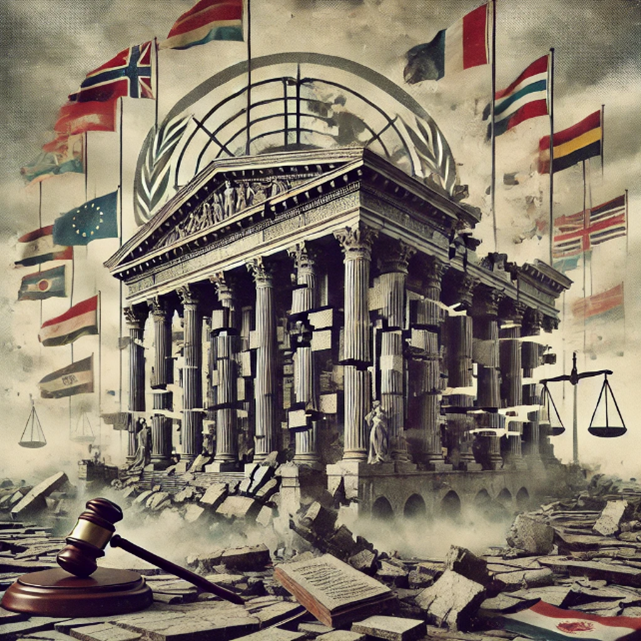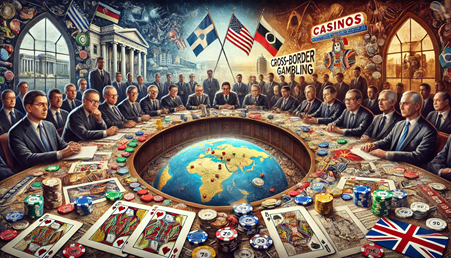How does the erosion of democratic norms in some countries impact global governance?

How does the erosion of democratic norms in some countries impact global governance?
by Sebastian 03:40pm Jan 02, 2025

How does the erosion of democratic norms in some countries impact global governance?
The erosion of democratic norms in some countries has significant implications for global governance, as it affects international cooperation, the effectiveness of global institutions, and the stability of the international system. As democracies weaken or falter, several key impacts on global governance can be observed:
1. Weakened Support for Multilateralism
Decline in Collaborative Efforts: Democracies have historically been strong advocates for multilateralism—cooperating through international institutions such as the United Nations, World Trade Organization, and the World Health Organization. When democratic norms erode in key countries, their commitment to multilateral cooperation can diminish. This leads to a retreat from global cooperation on key issues, including climate change, human rights, global security, and trade. For example, populist leaders in the U.S. and some European countries have at times withdrawn from international agreements (e.g., the Paris Agreement on climate change or the Iran nuclear deal), undermining efforts to address global challenges through collective action.
Nationalism and Isolationism: A shift toward nationalism and isolationism, often seen in the erosion of democratic norms, leads to a preference for unilateral action over multilateral solutions. This undermines global governance mechanisms that depend on countries working together, such as peacekeeping missions, conflict resolution efforts, and the management of global commons like the oceans or the atmosphere. The focus shifts away from shared global responsibilities toward narrow national interests, which can stall progress on global issues.
2. Diminished Credibility of International Institutions
Undermining International Law and Institutions: Democracies, when functioning effectively, are generally strong supporters of international laws, human rights standards, and the rule of law at the global level. However, when democratic norms erode, governments may adopt policies that violate international human rights standards, disregard international agreements, or show a lack of respect for the decisions of international bodies like the International Criminal Court (ICC) or the United Nations. This can diminish the authority of these institutions and weaken their ability to enforce global standards, as seen with some countries withdrawing from the ICC or ignoring UN resolutions.
Selective Engagement: Countries experiencing a decline in democratic norms may choose to selectively engage with international institutions. This creates a fragmented global governance system where some nations opt out of international norms or agreements, while others try to uphold them, leading to inconsistency and inefficiency in dealing with global issues.
3. Increased Geopolitical Instability
Shifting Alliances and Rivalries: Erosion of democratic norms can lead to shifting alliances and geopolitical instability. Authoritarian-leaning states may align with other autocratic governments, creating blocs that challenge the liberal democratic order and existing international institutions. This can heighten tensions between democratic and non-democratic countries, contributing to a less stable global political environment. The rise of authoritarianism in key countries like China and Russia has led to competing geopolitical models, which often undermine cooperative global governance frameworks.
Weakened Peace and Security Efforts: Democracies have often played a leading role in global peacekeeping, conflict resolution, and the promotion of human rights. When democratic norms are undermined, these countries may prioritize domestic stability over international peacekeeping or may weaken their commitment to peace negotiations, contributing to the spread of instability and regional conflicts. Additionally, weakened democracies may resort to authoritarian measures at home, which can exacerbate domestic unrest and spill over into international conflicts.
4. Spread of Authoritarianism and Human Rights Violations
Role Model for Other Countries: When democratic norms erode in influential countries, it sends a signal to others that such behavior may be tolerated on the global stage. In the worst-case scenario, authoritarian leaders may use the erosion of democratic norms in other countries as a model for their own governance, leading to the spread of illiberal practices. For example, governments that engage in censorship, crackdown on opposition, and limit political freedoms may find support or justification from other non-democratic regimes.
Impact on Human Rights: A decline in democracy often correlates with increased human rights abuses, as authoritarian governments are less likely to be held accountable. Global governance bodies, such as the UN Human Rights Council, rely on democratic states to champion human rights and hold violators accountable. When democratic countries weaken their commitment to human rights norms, the global system for protecting freedoms, promoting equality, and preventing abuses weakens, contributing to a more fragmented world where abuses can go unchecked.
5. Economic Consequences for Global Cooperation
Disruption of Trade Agreements and Economic Partnerships: Erosion of democratic norms can undermine global economic cooperation by affecting trade relations and the functioning of international economic institutions. Democracies typically support free trade, international standards, and the functioning of institutions like the International Monetary Fund (IMF) or the World Bank. When democratic governments give way to authoritarian or illiberal regimes, there may be a shift away from free trade principles, an increase in protectionist policies, and a general destabilization of international economic systems.
Unpredictability and Instability: As the erosion of democratic norms often leads to unpredictable political environments, global markets and foreign investments may be discouraged. Investors and businesses prefer stable, transparent environments, which are typically fostered by democratic governments. When democracies falter and authoritarianism rises, it creates economic uncertainty that can have ripple effects on global markets, leading to reduced global economic stability.
6. Challenge to Global Human Rights Standards
Weakening of Human Rights Norms: Democracies are typically the staunchest defenders of human rights at the global level. When these norms erode, countries may become less willing to take action on human rights abuses or may even undermine international human rights frameworks. This can lead to increased violations of civil and political rights, as authoritarian regimes have less external pressure to improve their human rights practices. For example, the rise of authoritarian governments with poor human rights records can undermine efforts to address global human rights violations, such as genocide, forced displacement, or ethnic cleansing.
Reduced Humanitarian Action: Democracies are often at the forefront of global humanitarian efforts. As they weaken, both in terms of domestic policies and their international commitments, global aid programs may become more selective or politicized. This could result in insufficient support for crises such as refugee movements, famines, or conflicts, making the work of humanitarian organizations more difficult.
7. Impact on Democracy Promotion and Global Governance Norms
Challenge to Democracy Promotion: Democracies often engage in promoting democratic values and governance structures in other parts of the world. This includes support for free and fair elections, civil society, political freedoms, and the rule of law. When democracies themselves face erosion of norms, it becomes more difficult for them to advocate for these principles globally. This weakening of the "democracy promotion" agenda can be seen in countries that reduce support for civil society or democratic development programs, or fail to act on their commitment to democracy abroad.
Undermining the Liberal International Order: The global order established after World War II, which emphasized the protection of human rights, democracy, and international cooperation, is closely tied to the stability and effectiveness of democratic regimes. The erosion of democratic norms in key countries challenges the liberal international order, making it harder to maintain international norms and values. As democracy declines in powerful countries, there is a risk that autocratic or authoritarian models could challenge these norms and attempt to reshape global governance to fit their own interests.
8. Disillusionment with Democracy and Its Alternatives
Global Disillusionment with Democratic Systems: As some democratic countries experience crises, including rising inequality, corruption, or political dysfunction, citizens and leaders in other parts of the world may lose confidence in democratic systems. This disillusionment can fuel the rise of autocratic or illiberal political models in other countries, leading to a broader global retreat from democracy. This undermines the idea of democracy as a global norm, as authoritarian leaders often exploit the weaknesses of democracies to justify their own anti-democratic policies.
Attracting Authoritarian Alliances: The erosion of democratic norms in major countries can shift the global balance, potentially creating alliances between authoritarian regimes that resist democratic principles. These countries may form counter-coalitions to challenge global governance institutions, such as the UN or the World Trade Organization, that are seen as promoting democratic values and norms.
Conclusion
The erosion of democratic norms in key countries has far-reaching consequences for global governance. It weakens multilateralism, undermines international institutions, fosters geopolitical instability, and erodes the commitment to human rights and the rule of law. As democracies retreat or backslide, the global system becomes more fragmented, with authoritarian models gaining ground and challenging the principles that have underpinned the post-World War II international order. The challenges posed by the erosion of democratic norms necessitate concerted efforts to strengthen democratic resilience, promote accountability, and reinforce global cooperation to address the issues facing humanity in the 21st century.






